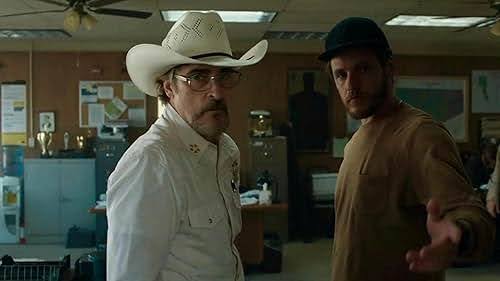‘Eddington’ Review: Ari Aster’s COVID Cowboys Leave Audiences Divided — But United in Ticket Queues — with Astoundingly Elusive Screenings at Cannes

CANNES — I got the golden ticket! After having spent the entirety of my brief first night at Cannes Film Festival in the standby lines for a last-minute ticket to the world premiere of Ari Aster’s highly anticipated Western “Eddington” to no avail, the ticket miraculously fell into my hands the very next day, thanks to someone giving it up on the festival’s very cutthroat ticketing website.
The last-minute queues amounted to possibly thousands of people. I could hardly imagine the kind of person who’d be willing to give up that ticket, but we take victories as they come!
Aster tackles the Western in “Eddington,” a new look for the director who previously found steady footing in the grotesque and psycho-horror genres. In setting the film during the COVID-19 pandemic, Aster puts a fascinating spin on the genre. An incredibly entertaining juxtaposition, Aster turns the authoritative trope of the town sheriff into a pathetically caviling anti-masker who duels in six-feet showdowns (or pissing contests) in grocery stores with his archnemesis, his trusty steed a Chevrolet clad in right-wing dogma and posters of his own face.
Aster’s directorial debut feature “Hereditary,” followed by his immensely popular film “Midsommar” and Freudian-epic “Beau is Afraid,” exemplified the director’s artistic vision and work ethic, cementing him as a twenty-first-century auteur. The film marked Aster’s debut at Cannes, and it’s no surprise that “Eddington” tickets were impossibly sought after at the festival.
“Eddington” takes place in the titular town of Eddington, New Mexico, and follows a star-studded ensemble in a COVID-nightmare-scape. Joseph Cross (Joaquin Phoenix) is Eddington’s small-town conservative and asthmatic sheriff who lives with his wife, Lou Cross (Emma Stone), since gone stir-crazy along with her mother, Dawn (Deirdre O’Connell), knee-deep in online conspiracies. As Cross grows increasingly frustrated with the town’s hyper-cautious culture surrounding mask mandates and the rising insurgence of young Black Lives Matter activists, he decides to run for mayor opposite Ted Garcia (Pedro Pascal), the town’s current mayor, who stands as Eddington’s own figurehead Gavin Newsom. Hilarity and chaos ensue.
“Eddington” is acute, mean as sin and certainly not complacent in its provocability. I usually find myself to be weary of COVID-based art and film, as it tends to end up a chainsaw-juggle of buzzwords and dumbfoundingly obvious concepts that dare to ask the question “Hey, remember what happened five years ago?” (Yes, we do!) and can pretty easily circlejerk the same couple jokes about Big Pharma and teens posting black squares on Instagram. I cannot sit here and tell you that “Eddington” is, in any way, absolved of this. The film sits pretty squarely over the nose (see what I did there?) and sledgehammers home its themes of misinformation, isolation and the absurd theatre of lockdown politics with a blatant disregard for subtlety and a seeming inability to take a cohesive stance. Regarding the divided reception at Cannes, Aster’s brute-force overtone seemed to be the smoking gun.
That being said, the movie is great. I never thought I would be convinced that 2020 was worth reliving on the big screen, but hey, it had me at “Western.” The film’s visual language of desolate grocery stores and the desert landscapes of New Mexico feels almost in dialogue with Altman’s grandiose Americana for the modern generation. The online climate of 2020 was unforgettably potent, and Aster interprets it seamlessly; weaving in and out of online conspiracies, Zoom calls and TikToks for social justice. Not only did its editing make for some snap-worthy location changes, but it did a lot for the narrative control, grounding us both in the solitary world of Eddington, New Mexico, and inheriting the pitiful lives of the ensemble who live as we once did.
Most every piece of “Eddington” earns its place, which is perhaps why its lack of subtlety didn’t bother me so much. The figure of the cowboy is a touchstone in American masculinity conventions, and Aster tears it apart in the playing field of a global pandemic where nothing is sacred and status quo means nothing. The more weight added into this redundantly recent time capsule, the more wonderfully idiotic Cross and Garcia’s rivalry became — one of their most climactic face-offs being over the volume at which a certain 2010s pop song was playing. You’ll get a kick out of it.
Between the bizarro (yet rather tame, for Aster) twists and turns and the unflinching, timely reinvention of the Western, the film invites a genuine suspension of disbelief. Aster’s wit comes through in dialogue and the control he maintains over his narrative — and it’s a whole lot easier to give yourself over to the gall when you feel like you’re in the hands of a director you can trust. “Eddington” is not Aster as we know him, but it’s a damn good look on him! If his first three projects didn’t prove it already, this one convinced me: I’d walk with him through anything.
Whether audiences at Cannes loved or hated it, the eagerness of theatergoers and the sheer volume of people waiting in last-minute queues stand to prove that we’re all looking forward to whatever comes next. Ari Aster, you’re safe another week!
“Eddington” is in competition for the Palme d’Or at Cannes this coming weekend, and is set to release in theatres in the United States starting July 18, 2025.
For more updates on the 2025 Cannes Film Festival, follow The Independent’s live reporting from the festival grounds here.
